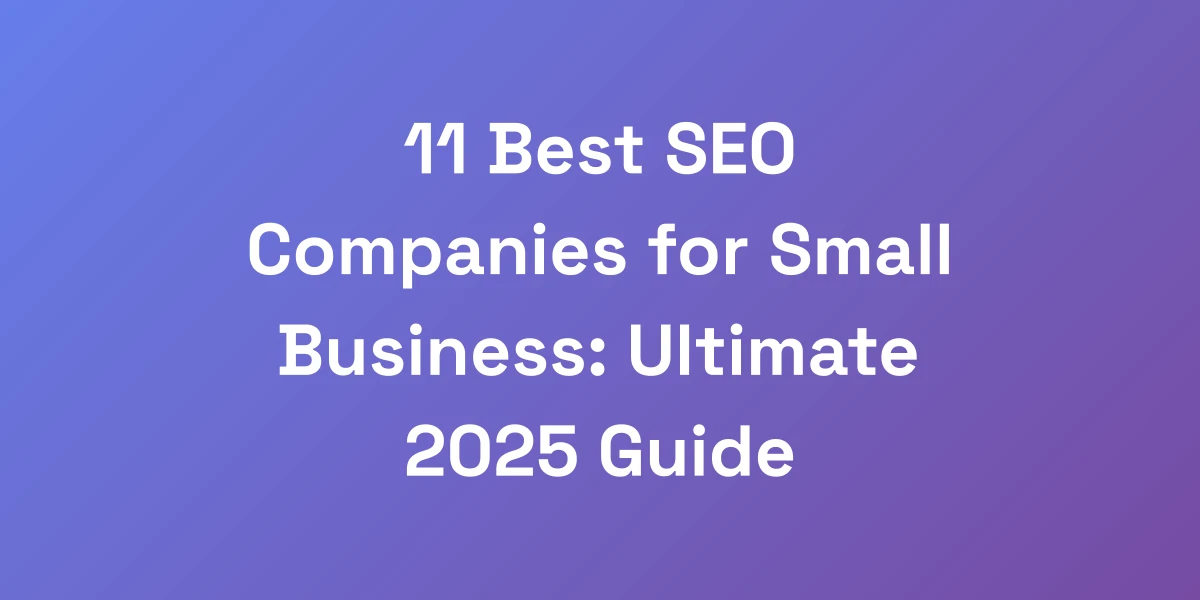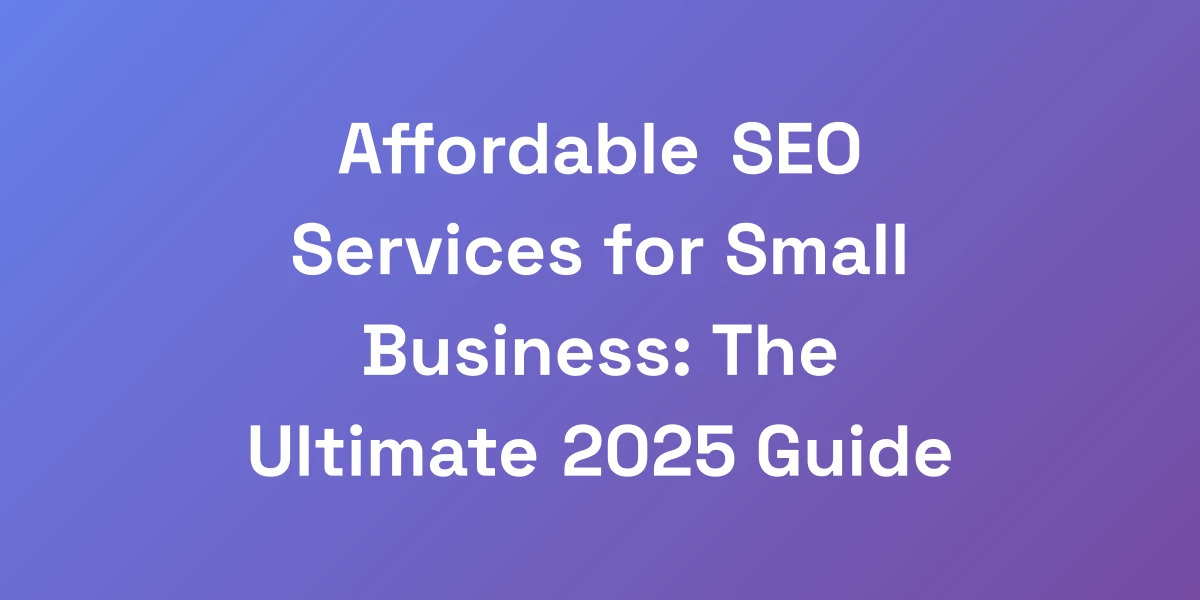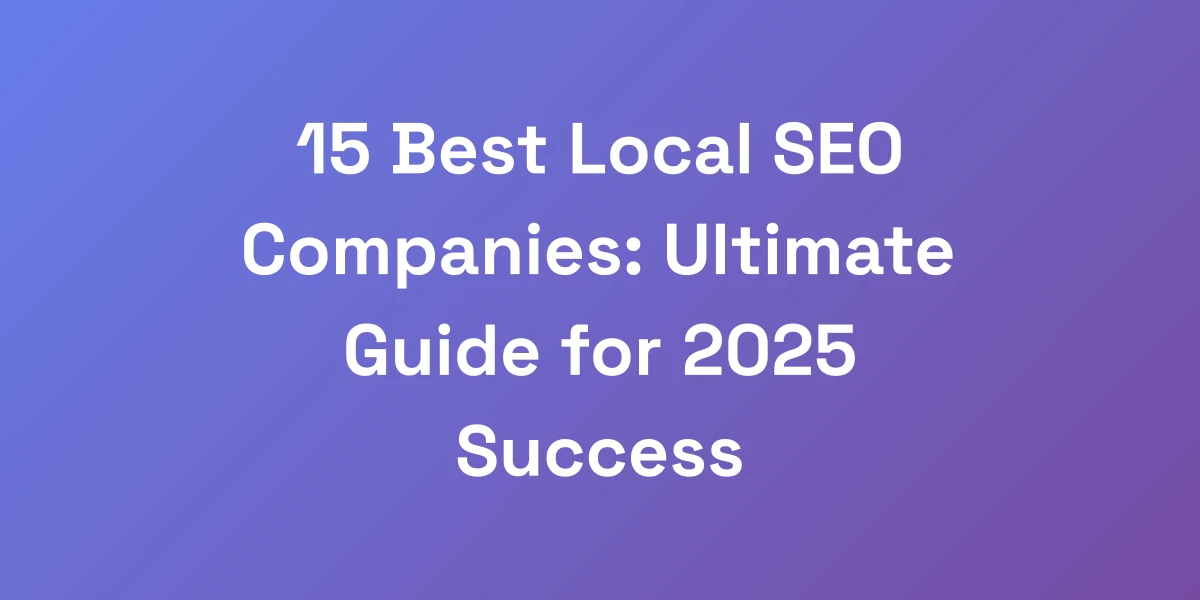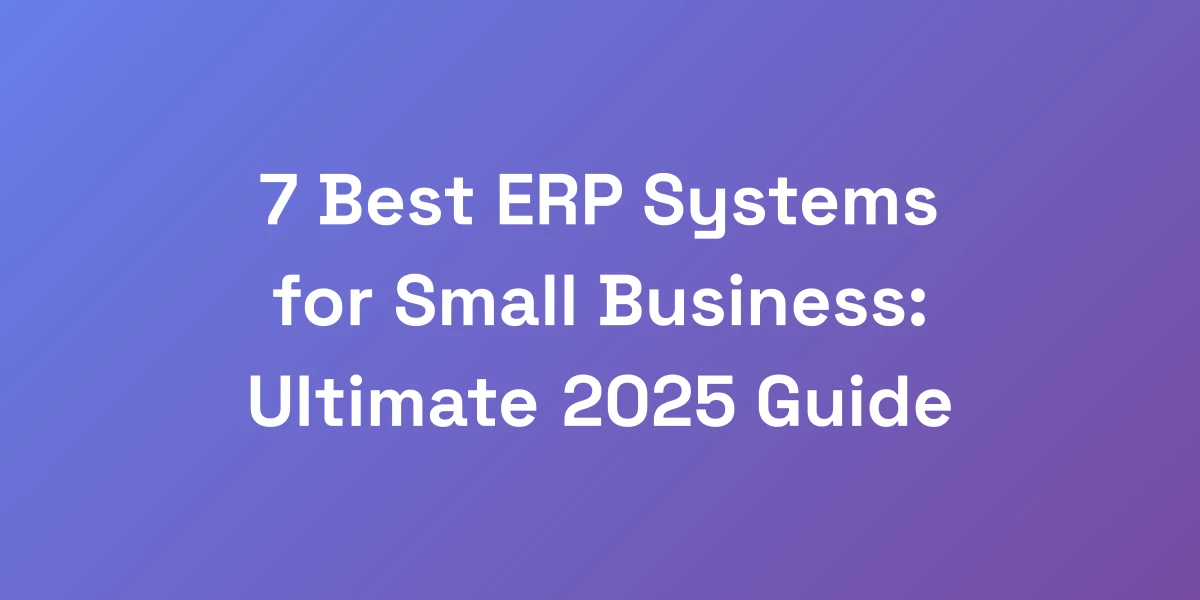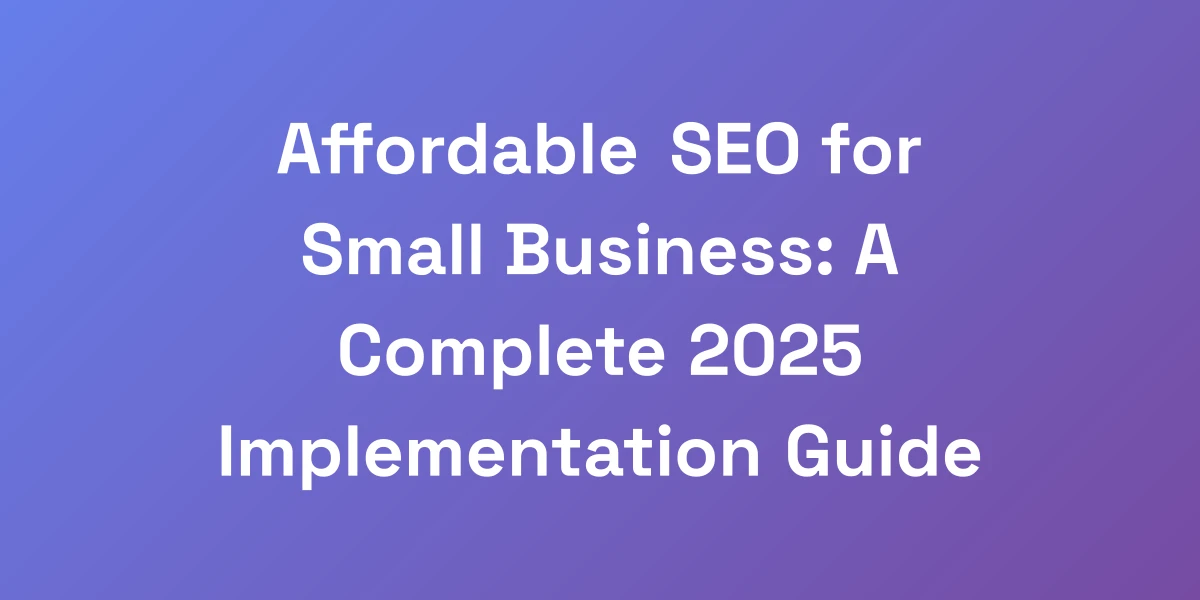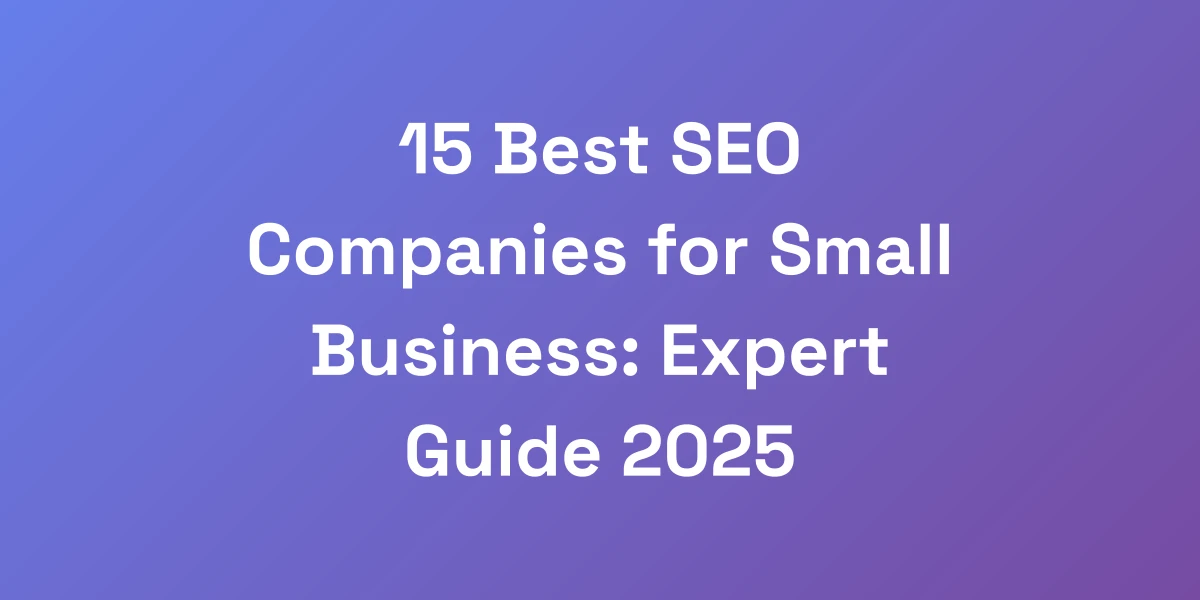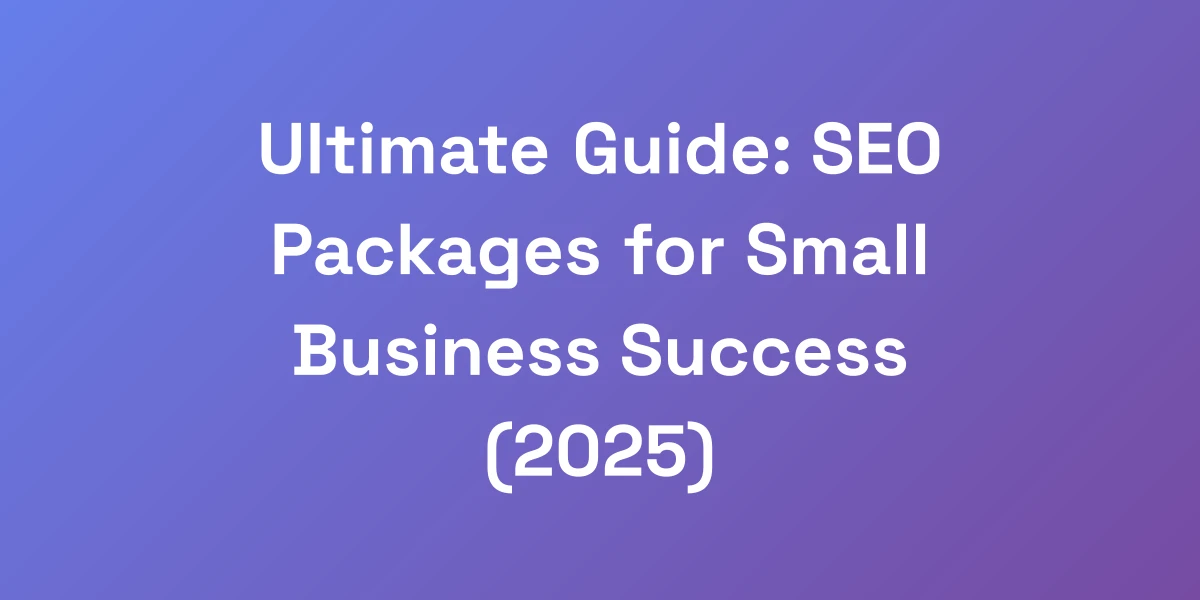
Ultimate Guide: SEO Packages for Small Business Success (2025)
Feb 24, 2025 | By [email protected]
Ever felt like navigating the vast ocean of SEO packages for your small business is like trying to find a needle in a haystack? You’re not alone.
In the ever-evolving digital landscape, choosing the right SEO package can make or break your online presence. But with so many options out there, how do you decide which one aligns perfectly with your needs?
We’ve all been there—wondering whether to invest in a comprehensive package or go for something more budget-friendly. The challenges are real, but understanding the intricacies of SEO packages for small businesses can demystify the process.
Imagine your SEO journey as a fitness regimen. You wouldn’t just join any gym without knowing what you need, right?
Similarly, selecting the right SEO package requires a clear understanding of your goals, budget, and the specific features that will drive your business forward.
In this guide, we’ll walk you through everything you need to know to make an informed decision, ensuring that your small business not only survives but thrives in the competitive online marketplace.
Understanding Small Business SEO Packages: A Complete Breakdown
Let’s dive into the fascinating world of SEO packages designed specifically for small businesses. As someone who’s spent countless hours optimizing content and studying digital marketing strategies, I’ve learned that choosing the right SEO package isn’t just about price – it’s about finding the perfect balance between cost, features, and results.
Think of SEO packages as different gym membership tiers – each offering unique benefits tailored to your specific goals and budget.
In this comprehensive guide, we’ll explore everything you need to know about selecting the ideal SEO package for your small business.
What Exactly Are SEO Packages?
SEO packages are bundled sets of services offered by agencies or freelancers aimed at improving your website’s visibility on search engines.
They typically include a range of strategies from keyword research to link building, all designed to enhance your site’s performance.
But not all SEO packages are created equal. Understanding what each package entails is crucial to making the right choice.
Core Components of Small Business SEO Services
Every robust SEO package includes several core components:
- Keyword Research: Identifying the terms your potential customers are searching for.
- On-Page SEO: Optimizing individual web pages to rank higher and earn more relevant traffic.
- Off-Page SEO: Building backlinks and authority to improve your site’s credibility.
- Content Creation: Developing high-quality, relevant content that attracts and engages your audience.
- Technical SEO: Ensuring your website is technically sound, with fast load times and mobile optimization.
- Analytics and Reporting: Tracking performance metrics to measure the effectiveness of the strategies implemented.
These components work together to create a comprehensive approach to improving your website’s search engine ranking.
Why Package-Based SEO Makes Sense for Small Businesses
Package-based SEO offers a structured approach, providing a clear outline of services and deliverables.
For small businesses, this means knowing exactly what you’re getting and how it aligns with your goals.
It eliminates the guesswork, allowing you to allocate your budget more effectively and monitor progress through defined metrics.
The Difference Between Basic, Standard, and Premium Packages
SEO packages typically come in tiers:
- Basic: Ideal for startups, includes fundamental SEO services like keyword research and basic on-page optimization.
- Standard: Offers a more comprehensive set of services, including content creation and some off-page SEO efforts.
- Premium: The most extensive packages, covering everything from advanced keyword strategies to robust link-building campaigns and detailed analytics.
Choosing the right tier depends on your business’s current needs and future goals.
Red Flags to Watch Out For in SEO Package Offerings
Not all SEO packages are created equal. Here are some red flags to be wary of:
- Guarantees of #1 Rankings: SEO is competitive and unpredictable. No reputable provider can guarantee top rankings.
- Lack of Transparency: If a provider isn’t clear about their strategies or pricing, it’s a major warning sign.
- One-Size-Fits-All Packages: Every business is unique. Avoid packages that don’t offer customization based on your specific needs.
- High-Touch Services with Low Results: Be cautious of packages that promise extensive services but don’t provide measurable results.
Breaking Down SEO Package Pricing: What’s Worth Your Investment
When it comes to SEO package pricing, many small business owners feel overwhelmed by the vast array of options.
From my experience analyzing hundreds of SEO services, I can tell you that quality SEO packages typically range from $500 to $5000 per month (how much does SEO cost).
But here’s the thing – it’s not just about finding the cheapest option.
It’s about understanding what you’re getting for your money and ensuring it aligns with your business goals.
Let’s break down the real value behind different price points and what you should expect at each level.
Average Cost Ranges for Different Package Levels
SEO packages come in various price ranges, each offering different levels of service:
- Basic Packages: $500 – $1,000 per month. Suitable for small businesses starting their SEO journey.
- Standard Packages: $1,000 – $3,000 per month. Ideal for businesses looking to expand their SEO efforts.
- Premium Packages: $3,000 – $5,000+ per month. Best for businesses aiming for aggressive growth and comprehensive SEO strategies.
These ranges provide flexibility based on your specific needs and budget constraints.
What Services to Expect at Each Price Point
At different price points, the services included in the packages vary:
- Basic Packages:
- Keyword research
- Basic on-page optimization
- Monthly performance reports
- Standard Packages:
- All basic services plus content creation
- Link-building strategies
- Comprehensive on-page SEO
- Local SEO optimization
- Premium Packages:
- Advanced keyword strategies
- Extensive content marketing
- Robust link-building campaigns
- Technical SEO audits
- Detailed analytics and reporting
- Ongoing optimization and strategy adjustments
Understanding what each package offers helps you assess their value relative to your business needs.
Hidden Costs and Additional Fees to Consider
While the upfront cost of an SEO package is clear, there can be hidden costs:
- Setup Fees: Some agencies charge an initial setup fee for onboarding and initial optimization.
- Additional Services: Services like extensive link building or advanced technical SEO might come at an extra cost.
- Content Creation: High-quality content often requires additional investment beyond standard packages.
- Consultation Fees: Additional consultations or strategy sessions may be billed separately.
Being aware of these potential additional costs helps in budgeting accurately and avoiding unexpected expenses.
ROI Calculations for Different Package Types
Understanding the return on investment (ROI) for your SEO package is crucial:
- Basic Packages: ROI is typically seen in increased traffic and initial keyword rankings, laying the foundation for future growth.
- Standard Packages: Expect more substantial ROI through improved search visibility, higher traffic, and better conversion rates.
- Premium Packages: These packages can drive significant ROI with comprehensive strategies that lead to sustained top rankings, substantial traffic growth, and enhanced brand authority.
Calculating ROI involves tracking key metrics like traffic, rankings, conversions, and overall revenue growth attributable to SEO efforts.
Cost Comparison: In-House vs. Agency vs. Freelancer
Choosing between in-house SEO, agencies, or freelancers depends on your business’s specific needs and resources:
- In-House SEO: Offers full control but can be costly due to salaries, benefits, and ongoing training.
- Agencies: Provide a comprehensive range of services with expertise, but at a higher price point.
- Freelancers: More affordable and flexible, but may lack the resources and breadth of services that agencies offer.
Assess your business’s capacity and goals to determine which option offers the best balance of cost and effectiveness.
Budget-Friendly Alternatives for Startups
Starting with a budget-friendly SEO approach doesn’t mean compromising on quality:
- DIY SEO: Utilize online resources and tools to manage your SEO in-house.
- Freelancer Services: Hire freelancers for specific tasks like content creation or technical optimization.
- SEO Tools: Invest in affordable SEO tools that offer essential functionalities like keyword research and site audits.
- Gradual Scaling: Start with a basic package and gradually upgrade as your business grows and your SEO needs expand.
These alternatives can provide a solid foundation, allowing you to scale your SEO efforts as your budget increases.
Essential Features Every Small Business SEO Package Should Include
After years of analyzing successful SEO campaigns, I’ve identified the non-negotiable elements that every small business SEO package should include. Think of these as the fundamental building blocks of your digital success.
Just like how a good workout routine needs both cardio and strength training, your SEO package needs a balanced mix of technical optimization, AI and SEO strategies, and link building.
Let me show you the must-have features that separate effective packages from mediocre ones.
Keyword Research and Strategy Development
At the heart of any successful SEO strategy is comprehensive keyword research. This involves identifying the terms and phrases your potential customers are using to find products or services like yours.
Effective keyword strategy development includes:
- Identifying Primary Keywords: Focus on high-volume, relevant keywords that drive traffic.
- Long-Tail Keywords: Target specific phrases that have lower competition but high intent.
- Competitor Analysis: Analyzing the keywords your competitors are ranking for can uncover opportunities.
- Keyword Mapping: Assigning specific keywords to relevant pages on your website ensures targeted optimization.
Implementing a solid AI for SEO strategies sets the foundation for all subsequent SEO efforts, ensuring your content is aligned with what your audience is searching for.
On-Page SEO Optimization Elements
On-page SEO refers to optimizing individual web pages to rank higher and earn more relevant traffic. Key elements include:
- Title Tags: Crafting compelling and keyword-rich titles that accurately describe your content.
- Meta Descriptions: Writing concise summaries that entice users to click through to your site.
- Headings (H1, H2, H3): Structuring your content with appropriate headings to enhance readability and SEO.
- URL Structure: Creating clean, descriptive URLs that include target keywords.
- Internal Linking: Connecting related content within your site to improve navigation and distribute page authority.
- Image Optimization: Using descriptive alt texts and compressing images for faster load times.
- Content Quality: Ensuring your content is informative, engaging, and provides real value to your audience.
These elements work together to make your website more accessible and appealing to both users and search engines.
Local SEO Components for Small Businesses
For small businesses targeting local customers, local SEO is crucial. It focuses on optimizing your online presence to attract business from local searches.
Essential local SEO components include:
- Google Business Profile Optimization: Ensuring your business information is accurate and complete on Google.
- Local Citations: Listing your business in local business directories and ensuring consistency in NAP (Name, Address, Phone Number).
- Local Keywords: Incorporating location-based keywords into your content and meta tags.
- Customer Reviews: Encouraging and managing online reviews to build credibility and trust.
- Geo-Targeted Content: Creating content that addresses local events, news, or activities relevant to your community.
These strategies help your business appear prominently in local search results, driving more foot traffic and local engagement.
Content Creation and Optimization
High-quality content is a cornerstone of effective SEO. It not only engages your audience but also signals to search engines that your site is authoritative and relevant.
Key aspects of content creation and optimization include:
- Informative Blog Posts: Writing articles that address your audience’s questions and pain points.
- Product Descriptions: Crafting detailed and keyword-rich descriptions that highlight the benefits of your offerings.
- Evergreen Content: Creating timeless content that remains relevant and continues to attract traffic over time.
- Multimedia Integration: Incorporating images, videos, and infographics to make your content more engaging.
- Content Updates: Regularly updating existing content to ensure accuracy and relevancy.
By investing in quality content, your small business can establish authority in your niche and attract a loyal audience.
Link Building and Authority Development
Link building is the process of acquiring hyperlinks from other websites to your own. It’s a critical component of off-page SEO and plays a significant role in improving your site’s authority.
Effective link-building strategies include:
- Guest Posting: Writing articles for reputable websites in your industry to earn backlinks.
- Broken Link Building: Identifying broken links on other sites and offering your content as a replacement.
- Resource Link Building: Creating valuable resources like guides or tools that others naturally want to link to.
- Local Citations: Ensuring your business is listed in local directories with backlinks to your site.
- Social Media Engagement: Sharing your content on social platforms to increase visibility and attract backlinks.
Building a strong backlink profile enhances your website’s credibility and improves its chances of ranking higher in search results.
Analytics and Performance Reporting
Tracking and analyzing your SEO efforts is essential to understand what’s working and where improvements are needed.
Key components of analytics and reporting include:
- Traffic Analysis: Monitoring the volume and sources of your website traffic.
- Keyword Rankings: Tracking how your target keywords are performing in search engine results.
- Conversion Rates: Measuring how effectively your website converts visitors into customers.
- Backlink Monitoring: Keeping an eye on the quality and quantity of backlinks pointing to your site.
- Engagement Metrics: Analyzing metrics like bounce rate, time on site, and pages per session to gauge user engagement.
Regular reporting provides actionable insights, allowing you to fine-tune your SEO strategies for optimal results.
How to Choose the Right SEO Package for Your Business Size
Selecting the perfect SEO package is like choosing the right tool for a specific job – it needs to match your business’s unique requirements perfectly.
Through my experience working with various small businesses, I’ve developed a systematic approach to package selection that considers your industry, budget, and growth goals.
Let me share my proven framework for matching your business needs with the right level of SEO support.
Assessing Your Business’s SEO Needs
Start by evaluating your current SEO status and identifying areas that need improvement.
Key questions to ask include:
- What are your primary business goals? (e.g., increased traffic, higher conversions, brand awareness)
- What is your current SEO performance?
- What specific SEO services do you need? (e.g., local SEO, content creation, technical optimization)
- What is your budget for SEO services?
Understanding your needs lays the groundwork for selecting a package that aligns with your objectives.
Industry-Specific Package Considerations
Different industries have unique SEO requirements. What works for a local café may not be effective for an e-commerce store.
Consider the following:
- Competitive Landscape: Highly competitive industries may require more intensive SEO efforts.
- Target Audience: Understanding where your audience searches and the keywords they use is crucial.
- Regulatory Requirements: Some industries have specific regulations that impact SEO strategies.
Tailoring your SEO package to your industry ensures that the strategies employed are relevant and effective.
Scalability and Growth Potential
Your SEO needs will evolve as your business grows. It’s essential to choose a package that can scale with you.
Consider:
- Flexibility: Can the package be adjusted as your needs change?
- Growth Plans: Does the package support your long-term business goals?
- Additional Services: Are there options to add or upgrade services as needed?
Choosing a scalable package ensures sustained SEO support, helping your business grow without having to switch providers.
Timeline Expectations for Different Packages
SEO is a long-term investment, but different packages offer varying timelines for noticeable results.
Generally:
- Basic Packages: Expect initial improvements within 3-6 months.
- Standard Packages: Significant results often seen within 6-12 months.
- Premium Packages: Comprehensive results and sustained growth within 12+ months.
Setting realistic expectations helps in planning and measuring the success of your SEO efforts.
Measuring Success and KPIs
To gauge the effectiveness of your SEO package, establish clear Key Performance Indicators (KPIs).
Common KPIs include:
- Organic Traffic: The number of visitors coming from search engines.
- Keyword Rankings: The positions of your targeted keywords in search results.
- Conversion Rate: The percentage of visitors who take a desired action.
- Backlink Quality: The authority and relevance of the sites linking to yours.
- Engagement Metrics: User interaction metrics like bounce rate and time on site.
Regularly monitoring these KPIs allows you to assess the impact of your SEO package and make informed decisions.
When to Upgrade Your Package
There comes a time when your initial SEO package may no longer suffice as your business grows.
Signs that it’s time to upgrade include:
- Stagnant Growth: Your traffic or conversions have plateaued despite ongoing efforts.
- Expanded Goals: You’re targeting new markets or launching new products.
- Increased Competition: More competitors are entering your market, requiring more robust SEO strategies.
- Advanced Needs: Your website requires more technical SEO support or comprehensive content strategies.
Upgrading ensures that your SEO efforts continue to align with your evolving business objectives.
Maximizing Results from Your SEO Package Investment
Getting the most out of your SEO package isn’t just about choosing the right one – it’s about knowing how to leverage it effectively.
Based on my experience helping businesses optimize their SEO investments, I’ve discovered that success often lies in the implementation and monitoring phases.
Let me share some practical strategies that will help you maximize the return on your SEO package investment.
Working Effectively with Your SEO Provider
Building a strong partnership with your SEO provider is crucial for achieving desired outcomes.
Here’s how to ensure a productive collaboration:
- Clear Communication: Set clear expectations and maintain open lines of communication.
- Set Goals: Define specific, measurable goals that align with your business objectives.
- Regular Updates: Schedule regular check-ins to review progress and adjust strategies as needed.
- Provide Feedback: Share your insights and feedback to help your provider refine their approach.
- Be Active Participants: Engage actively in strategy discussions and implementation processes.
A collaborative approach ensures that both you and your provider are aligned towards common goals.
Complementary Marketing Strategies
SEO works best when integrated with other marketing strategies. Here are some complementary approaches:
- Content Marketing: Creating valuable content that attracts and engages your audience enhances your SEO efforts.
- Social Media Marketing: Promoting your content on social channels can drive traffic and build backlinks.
- Email Marketing: Using email campaigns to distribute your content can increase engagement and repeat visits.
- Pay-Per-Click (PPC) Advertising: Combining SEO with PPC can provide immediate visibility while your SEO efforts gain traction.
Integrating these strategies creates a cohesive marketing ecosystem that amplifies your SEO results.
Monitoring and Tracking Progress
Continuous monitoring is essential to track the effectiveness of your SEO strategies and make necessary adjustments.
Important aspects to monitor include:
- Keyword Performance: Regularly check how your targeted keywords are ranking.
- Traffic Sources: Analyze where your traffic is coming from to identify successful channels.
- Conversion Metrics: Measure the conversion rates of different traffic sources to optimize your strategies.
- Engagement Levels: Assess user engagement to understand how visitors interact with your site.
- Backlink Quality: Continuously evaluate the quality of your backlinks to maintain a strong backlink profile.
Using tools like Google Analytics and SEO dashboards can simplify the tracking process, providing real-time insights into your performance.
Making Data-Driven Adjustments
Data is your best friend when it comes to optimizing your SEO strategies. Here’s how to use it effectively:
- Identify Trends: Look for patterns in your data that indicate what’s working and what’s not.
- Optimize Underperforming Areas: Use insights to improve content, keywords, or technical aspects that aren’t delivering results.
- Experiment with New Strategies: Use data to test new approaches and measure their effectiveness before fully integrating them.
- Refine Targeting: Adjust your keyword focus based on the performance data to better align with user intent.
Data-driven adjustments ensure that your SEO efforts remain aligned with your business goals and market dynamics.
Long-term Strategy Development
SEO is not a one-time effort but a continuous journey. Developing a long-term strategy ensures sustained growth and adaptability.
Key elements include:
- Ongoing Keyword Research: Regularly update your keyword strategy to stay ahead of trends and changes in user behavior.
- Content Expansion: Continually create and optimize content to cover new topics and address emerging customer needs.
- Technical Maintenance: Keep your website technically sound with regular audits, updates, and optimizations.
- Adapt to Algorithm Changes: Stay informed about search engine updates and adjust your strategies accordingly.
- Build Long-Term Relationships: Foster relationships with industry influencers and high-authority websites for sustained link building.
A long-term strategy ensures that your SEO efforts contribute to ongoing success and resilience in a dynamic digital environment.
Common Pitfalls to Avoid
Even with the best intentions, certain pitfalls can derail your SEO efforts. Here’s what to watch out for:
- Ignoring Analytics: Failing to monitor and analyze performance data can lead to ineffective strategies.
- Overlooking Mobile Optimization: With mobile traffic on the rise, a mobile-friendly website is non-negotiable.
- Keyword Stuffing: Overloading your content with keywords can harm readability and lead to penalties.
- Neglecting Local SEO: For local businesses, ignoring local SEO can mean missing out on critical traffic and customers.
- Using Black-Hat Techniques: Tactics like buying links or keyword stuffing can result in search engine penalties.
- Failing to Update Content: Outdated content can harm your site’s credibility and rankings.
Avoiding these common mistakes ensures that your SEO efforts remain effective and your site maintains its integrity in the eyes of search engines.
Conclusion
Embarking on the journey to select the right SEO package for your small business might seem daunting, but with the right knowledge and approach, it can lead to remarkable growth.
We’ve explored the essential aspects of SEO packages, from understanding core components and pricing to selecting the right package and maximizing your investment.
The key takeaway is that an effective SEO package is one that aligns with your unique business needs, offers a balanced set of services, and is backed by a transparent and collaborative provider.
Ready to take your small business to the next level? Start by assessing your SEO needs, setting clear goals, and choosing a package that offers the right mix of services and support.
Have questions or need personalized advice on selecting the best SEO package for your business? Drop a comment below or reach out to us directly. Let’s navigate the SEO landscape together and unlock your business’s full potential.
